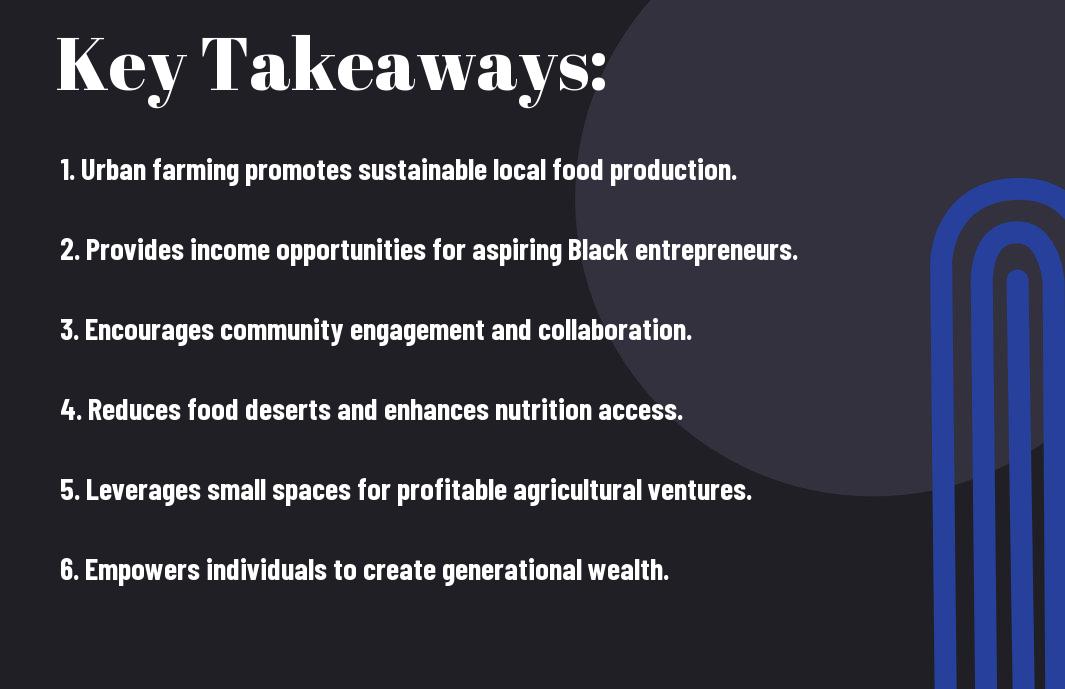You have the opportunity to tap into urban farming as a means to achieve financial independence while contributing positively to your community. This innovative approach not only allows you to grow fresh produce in urban settings but also empowers you to create a sustainable business model that can thrive in today’s economy. By leveraging your skills and passion for agriculture, you can take advantage of the increasing demand for local food sources, gain financial freedom, and inspire others within your community to commence on a similar journey.
Key Takeaways:
- Community Impact: Urban farming can foster stronger local economies and provide job opportunities, benefiting Black communities.
- Diverse Revenue Streams: Entrepreneurs can explore various avenues such as selling produce, offering workshops, and agritourism to enhance financial independence.
- Access to Resources: Leveraging local grants, mentorship programs, and partnerships can help Black entrepreneurs succeed in the urban farming sector.

The Rise of Urban Farming
As urban populations grow and the demand for fresh, locally sourced food increases, urban farming has emerged as a viable solution. This movement not only addresses food deserts in cities but also empowers entrepreneurs to grow their businesses sustainably. With initiatives promoting community gardens and rooftop farms, urban farming offers an opportunity for you to engage in a transformative trend that fosters economic independence and environmental balance.
Historical Context
Behind the scenes of today’s urban farming movement lie centuries of agricultural practices adapted to urban spaces. Historically, communities have relied on small-scale farming to meet their needs, particularly during economic hardships. The 1970s saw a resurgence of this practice as people recognized the benefits of growing food locally, laying the foundation for the modern urban farming movement you see today.
Current Trends
Rise in awareness about food sustainability and health consciousness has led to dynamic changes in urban farming practices. Increasingly, you can spot vertical farms, hydroponics, and aquaponics sprouting up in urban areas, creating innovative solutions to maximize space and resources. As more people seek to reduce their carbon footprints, urban agriculture has become a sought-after solution that aligns with modern values of sustainability and local economic development.
Trends in urban farming reflect a growing ethos around community engagement and food sovereignty. You may notice that many urban farmers are joining cooperatives or forming partnerships with local businesses to enhance their impact. Digital technology has also played a significant role, allowing for better planning and marketing of produce. Additionally, the integration of educational programs focuses on teaching others about sustainable practices, ensuring future generations carry on the tradition of urban farming while contributing to financial independence. This synergy of technology, community, and tradition provides a strong foundation for your entrepreneurial aspirations in the urban farming sphere.

Financial Benefits of Urban Farming
Even in an urban setting, farming can become a lucrative endeavor that empowers you to achieve financial independence. Growing your own produce reduces food costs, and as you expand your skills, you can tap into local markets and community-supported agriculture. Urban farming not only provides fresh produce but also creates numerous opportunities for you as an entrepreneur to generate income in a sustainable manner.
Cost-Effective Practices
One way to maximize your profits in urban farming is by adopting cost-effective practices. Utilizing vertical gardening, container planting, and hydroponics can significantly reduce your initial investment and space requirements, allowing you to start small and scale as you learn and grow.
Revenue Streams for Entrepreneurs
One of the exciting aspects of urban farming is the wide array of potential revenue streams available to you. As you cultivate your green thumb, you can sell your produce directly to consumers at farmers’ markets, offer subscription boxes, or even establish partnerships with local restaurants and grocery stores.
But the revenue opportunities don’t end there. You can diversify your income by offering workshops, selling gardening supplies, or creating value-added products, like jams or pickles. Additionally, consider leveraging social media to market your urban farm and reach a broader audience. As you explore these various avenues, you will find paths that align with your interests and skill set, enhancing your financial stability and independence in the process.
Skills and Knowledge Required
Keep in mind that becoming a successful urban farmer requires a diverse skill set. You will need to develop practical agricultural techniques, understand local regulations, and harness business acumen to navigate market demands. Additionally, acquiring knowledge in areas like pest management, crop rotation, and sustainable practices will empower you to optimize your yields and maintain a profitable operation.
Agricultural Techniques
Behind every successful urban farm lies a deep understanding of agricultural techniques. You should familiarize yourself with soil health, hydroponics, or vertical farming systems to increase productivity in limited spaces. Learning about seasonal planting schedules and organic pest management will help you produce high-quality crops that stand out in the market.
Business Management
Above all, running an urban farming venture demands strong business management skills. Understanding financial planning, market research, and customer engagement will be vital for your long-term success. You will need to track expenses, set pricing strategies, and create marketing plans that resonate with your audience.
And as you research into business management, consider developing a clear vision and mission for your farming enterprise. Cultivating skills in budgeting and forecasting can significantly impact your operations. Engaging with local communities, securing partnerships, and utilizing social media for promotion will also enhance your visibility and customer base, ultimately steering you toward financial independence.
Challenges Faced by Black Entrepreneurs in Urban Farming
Many Black entrepreneurs encounter various obstacles in urban farming, from financial constraints to limited access to land. These challenges can create a barrier to entry in a field that demands both creativity and resilience. The systemic issues often leave you grappling with disparities in funding opportunities and resources necessary for establishing a successful urban farming venture.
Access to Resources
Black entrepreneurs struggle with access to resources, including funding, land, and technical support. Without sufficient financial backing, you may find it difficult to invest in necessary equipment or crop development. Additionally, navigating the complexities of urban land use can be daunting, often leading to missed opportunities for cultivating your farming aspirations.
Overcoming Systemic Barriers
By addressing systemic barriers, you can empower yourself to cultivate a thriving urban farming business. Connecting with local organizations, attending workshops, and building a supportive network can provide valuable insights and resources that help bridge the gap created by systemic inequities. Collaboration with other entrepreneurs allows you to share knowledge and experiences that uplift your community.
A multifaceted approach to overcoming systemic barriers involves advocating for policy changes that support increased access to land and resources for Black farmers. Engaging in local government discussions and forming coalitions with other minority-owned businesses can amplify your voice. You can also explore grants and micro-loans specifically designed to empower Black entrepreneurs in the agricultural sector. By actively participating in these initiatives, you pave the way for a more equitable landscape in urban farming.
Successful Case Studies
Now, let’s explore some successful case studies that demonstrate the potential of urban farming for Black entrepreneurs:
- Will Allen, Growing Power: Built a non-profit organization that generated over $1 million in revenue while serving underprivileged communities.
- Jasmin K. Weller, Urban Farm & Greenhouse: Grew her urban farm into a profitable venture with 35% year-over-year growth, providing organic produce to local markets.
- Nicole Marquis, Front & Palmer: Launched a farm-to-table restaurant that not only supports local urban farmers but also generates $2 million in annual revenue.
- Ron Finley, The Gangster Gardener: Created a community garden that produced over 2,000 pounds of food annually, transforming vacant lots into productive spaces.
Profiles of Black Urban Farmers
Between urban gardens in cities across the U.S., you’ll find inspiring profiles of Black urban farmers such as Will Allen, who empowers communities through sustainable farming practices, and Ron Finley, known for turning neglected spaces into fruitful gardens that educate and nourish. These entrepreneurs not only cultivate crops but also foster community engagement and economic growth.
Lessons Learned
Farmers in urban environments often encounter unique challenges and opportunities that provide valuable insights you can apply to your own journey.
It’s imperative to understand your local market and community needs, which can guide your crop selection and marketing strategies. Diversifying your offerings can mitigate risks and stabilize income. Collaboration with local organizations can enhance resources and bolster community support. Finally, leveraging technology and social media can amplify your reach and impact, connecting you with customers and fellow entrepreneurs. By learning from these experiences, you’re set on a pathway to success in urban agriculture.
Community Impact and Empowerment
Despite the challenges faced by urban areas, urban farming serves as a powerful tool for community empowerment. By fostering collaboration among residents, you can create opportunities for local engagement, skill sharing, and collective growth. This approach not only strengthens ties within the community but also instills a sense of pride and ownership among participants, leading to sustainable community development.
Building Local Economies
Community gardens and urban farms are vital in enhancing local economies. As you cultivate fresh produce, you contribute to job creation, stimulate local entrepreneurship, and increase access to diverse markets. By supporting local farmers and food artisans, you help establish a robust network that benefits everyone in the area.
Promoting Food Justice
Among the many benefits of urban farming is its potential to promote food justice. By prioritizing equitable access to nutritious food, you can help address systemic inequalities within your community, ensuring that all members have the resources they need for a healthy lifestyle.
Local urban farms often serve as hubs for education and outreach, bridging gaps between various community groups. By organizing workshops and events, you can teach residents about healthy eating, sustainable practices, and the importance of supporting local agriculture. As these initiatives grow, they empower individuals to make informed choices, advocate for their rights, and contribute to a more just food system. Ultimately, your involvement in urban farming can spark a movement that transforms food access and equity within your community.
Conclusion
Following this exploration of urban farming, you can see its potential as a pathway to financial independence for Black entrepreneurs. By cultivating your skills, utilizing available resources, and engaging with your community, you can create sustainable income streams while also addressing food deserts. Embracing urban farming not only enhances your economic wellbeing but also contributes to the health and vitality of your community, paving the way for future generations.
FAQ
Q: What is urban farming and how can it benefit Black entrepreneurs?
A: Urban farming refers to the practice of cultivating, processing, and distributing food in or around urban areas. For Black entrepreneurs, urban farming can provide a sustainable source of income, increase access to nutritious foods in their communities, and contribute to local economies. By leveraging available land and resources, entrepreneurs can create profitable businesses that not only serve their needs but also engage and empower their communities, fostering economic independence and resilience.
Q: What resources or support systems are available for Black entrepreneurs looking to start an urban farming business?
A: There are several resources and support systems available, including grants and funding opportunities specifically tailored for minority-owned businesses. Local agricultural extension services often provide workshops and training programs on urban farming techniques. Additionally, community organizations and non-profits may offer mentorship programs, networking events, and access to shared resources such as community gardens. Online platforms and social media networks can also connect aspiring entrepreneurs with others in the field for advice and collaboration.
Q: How can urban farming contribute to community development and social change?
A: Urban farming has the potential to transform communities by addressing food deserts, reducing food insecurity, and promoting sustainable practices. When Black entrepreneurs establish urban farms, they not only create jobs but also foster a sense of community through shared spaces for education and collaboration. These initiatives can inspire social change by promoting health and wellness, encouraging local food systems, and empowering residents to take control of their food sources. Through education and outreach, urban farming can also raise awareness about agricultural practices and environmental stewardship.








